
As we broadcast all week from COP29 in Baku, climate justice activists and civil society groups have raised concern over Azerbaijan’s role as host of the U.N. climate talks. The authoritarian country has cracked down on journalists, activists and government critics leading up to COP29 and has been accused of using the climate summit to drum up business for its oil and gas industry. On Wednesday, Democracy Now! attended a news conference led by Azerbaijani Deputy Foreign Minister Yalchin Rafiyev, who is the COP29 lead negotiator, but who refused to answer a question about the arrests. Democracy Now! host Amy Goodman later tried to ask Rafiyev in the halls of the convention venue, but he again refused to answer.
Transcript
AMY GOODMAN: This is Democracy Now!, democracynow.org, The War and Peace Report. I’m Amy Goodman. We’re broadcasting from the U.N. climate summit in Baku, Azerbaijan.
Earlier today, Democracy Now! attended the news conference of the COP presidency. It was led by Azerbaijan’s Deputy Foreign Minister Yalchin Rafiyev, who’s also the COP29 lead negotiator. I asked him a question.
AMY GOODMAN: Hi. I’m Amy Goodman from Democracy Now! news. Thank you so much for making the COP presidency available to the press. Many journalists and climate activists have been arrested here in Azerbaijan in the lead-up to the COP, including the anti-corruption economist Gubad Ibadoghlu, who’s called for greater transparency in oil and gas revenues, and climate activists like Anar Mammadli, who co-founded a climate justice group, weeks before the COP. My question is: Will they, among many other arrests in this lead-up to the COP, be freed? Why were they arrested? And since it’s Tourism Day here at the COP, don’t you think that this is a great threat to tourism when you have a crackdown like this in a country?
YALCHIN RAFIYEV: Thank you. Surely, I’m not going to comment on any ongoing judicial processes. We are here to make a collective effort for the sake of humanity to agree and adopt important decisions on climate action. And I’m sure, with this, with the determination of the parties, we will get there. I would be more than happy to answer any questions related to climate and the ongoing negotiations. Thank you.
AMY GOODMAN: They are climate activists, climate economists.
ALEXANDER SAIER: Excuse me. We’ve — we continue.
AMY GOODMAN: After the news conference, I caught up with Yalchin Rafiyev of Azerbaijan, representing the COP presidency, as he spoke with journalists outside the room.
AMY GOODMAN: Sir, could you comment on the climate activists who have been arrested?
HANDLER: He’s got a — he’s got quite a busy schedule.
AMY GOODMAN: Yes, I understand.
HANDLER: So, I appreciate your interest.
AMY GOODMAN: As Azerbaijan’s chief negotiator moved quickly down the hall, I followed up.
AMY GOODMAN: Could I just get one quick comment from you on the arrests of the climate activists and the journalists in the lead-up to this COP?
YALCHIN RAFIYEV: I have clearly answered your question. Thank you. I’m sorry that I’m running out to a meeting.
AMY GOODMAN: You said it’s not related to climate, but they’re climate activists and economists and looking at the gas and oil sector. Just a brief answer from the press?
That was Azerbaijan’s chief negotiator representing the COP presidency here at COP29. As I tried to catch up with him after to follow up on my question on the crackdown on the press and climate justice activists in this lead-up to the COP, he had said that my question was irrelevant to the news conference, and now he said he was too busy to answer it, although he did stop to answer other journalists’ questions.
AMY GOODMAN: That was Azerbaijan’s Deputy Foreign Minister Yalchin Rafiyev, who’s also the COP29 lead negotiator.

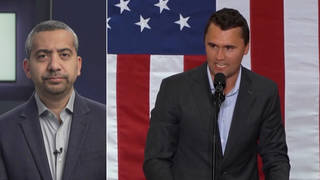
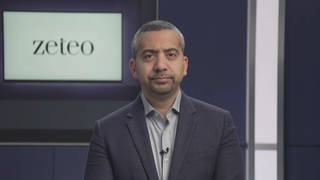
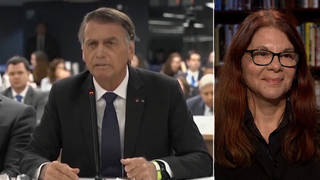
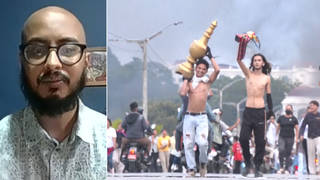





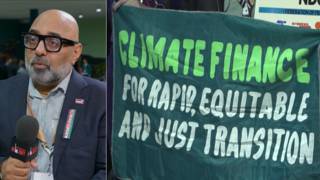
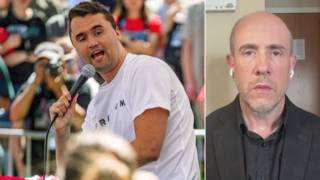
Media Options